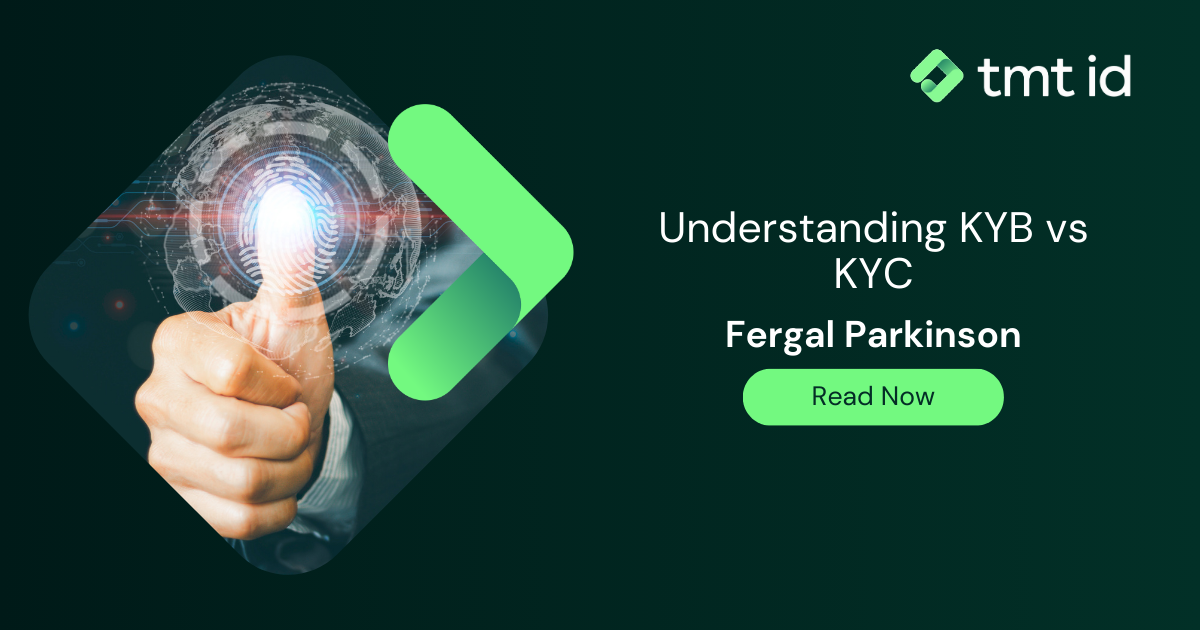

In finance, verifying both customers and businesses is key to compliance and risk management. KYB and KYC are the specific tools that businesses and organisations must use to help minimise the risks of online fraud targeting their customers. They are compulsory within the financial sector, and recommended to additional industries, to help prevent fraud.
KYB is Know Your Business, which means verifying businesses. That’s understanding the business structure and ownership, to ensure legitimacy. KYC is Know Your Customer, which means verifying individual customers, to ensure their identity is real and to prevent fraud and comply with regulations.
KYB is the business verification process that identifies the business’s ownership structure and ultimate beneficiary owner (UBO). A risk assessment is also conducted, which checks for sanctions, criminal records and adverse media reports. This is to ensure the business in question is legitimate and not fraudulent.
KYC is the individual customer verification process. Read more about KYC for financial institutions in our related article.
The main difference between KYB and KYC is the focus. KYB is on businesses, requiring information on ownership and operations, while KYC is on individuals, covering personal identification and financial behaviour. This results in different types of information being collected and analysed.
Here are examples of the types of information collected during KYB checks:
Business Name and Registration: The official name and registration number of the business as registered with the government.
Business Structure: The entity of a corporation, partnership, sole proprietorship, etc.
Legal Entity Identifier (LEI): A unique identifier for legal entities involved in financial transactions.
Ultimate Beneficial Owners (UBOs): Individuals who own or control the business, usually those with 25% or more ownership.
Management Details: Key executives and directors, their identification and background checks.
Financial Statements: Recent financial statements to check the business’ financial health and stability.
Bank Account Information: Business bank accounts to verify banking relationships and transaction patterns.
Business Address: Business headquarters and any other operational addresses.
Nature of Business: Description of business activities, industry and services or products offered.
Licenses and Permits: Proof of required licenses and permits to operate in the jurisdiction.
Sanctions and Watchlists: Checks against global sanctions lists, watchlists and adverse media for legal or regulatory issues.
Articles of Incorporation: Documents that establish the business and outline its purpose, structure, and governance.
Tax Identification Number (TIN): Business’s tax ID for verification and tax compliance.
By collecting and verifying this information, banks can ensure they are dealing with legitimate businesses and comply with regulations to prevent fraud, money laundering and other financial crimes.
Many institutions are now turning to automated and digital compliance solutions. These advanced tools are more efficient, accurate and scalable. They also reduce risk and ensure compliance for financial institutions.
Mobile number data can be used to automate parts of both your KYC and KYB checks without compromising the information provided or the quality of your checks. Our Verify API uses trusted data from around the world to link a person to the mobile number provided by a customer, to check if it is real and active.
Globally KYB and KYC is governed by a complex regulatory framework. In the US, EU and UK, there are specific regulations that outline the requirements for compliance. Institutions must navigate these regulations carefully to avoid penalties and meet the standards.
In the USA, KYB and KYC are governed by several laws and regulatory bodies:
Bank Secrecy Act (BSA): Financial institutions to assist in detecting and preventing money laundering.
USA PATRIOT Act: Enhances KYC and requires customer identification programs (CIP) to verify an individual’s identity when opening an account.
Anti-Money Laundering (AML) Compliance: Financial institutions implement AML programs including KYC to monitor and report suspicious activities.
FinCEN (Financial Crimes Enforcement Network): Requires the collection of beneficial ownership information for legal entities through the Customer Due Diligence (CDD) Rule.
Corporate Transparency Act (CTA): Requires companies to report beneficial ownership information to FinCEN to increase transparency and combat illicit activities.
These regulations aim to prevent money laundering, terrorist financing and other financial crimes by verifying individual customers and business entities thoroughly.
In the United Kingdom, KYB and KYC is governed by several laws and regulatory frameworks:
Money Laundering, Terrorist Financing and Transfer of Funds (Information on the Payer) Regulations 2017: Financial institutions implement customer due diligence (CDD) measures.
The Proceeds of Crime Act (POCA) 2002: Reporting and prevention of money laundering.
Financial Conduct Authority (FCA) Regulations: Guidance for financial institutions to identify, assess and manage financial crime risks.
Companies Act 2006: Companies must maintain accurate information about their ownership and control structure.
People with Significant Control (PSC Register): Companies are to keep and maintain a register of people with significant control over the business to increase transparency and accountability.
Corporate Transparency and Register Reform: Ongoing reforms to improve beneficial ownership information.
These regulations require financial institutions and businesses in the UK to do thorough due diligence to prevent financial crimes and comply with the laws.
In the European Union, KYB and KYC is governed by a set of laws to prevent money laundering and terrorist financing:
4th and 5th Anti-Money Laundering Directives (AMLD4 and AMLD5): Requires financial institutions to implement customer due diligence (CDD) procedures, verify customer’s identity and monitor transactions for suspicious activities.
General Data Protection Regulation (GDPR): Personal data collected during the KYC process, to be protected and handled under data privacy laws.
Beneficial Ownership Directive: Requires identification and verification of beneficial owners of companies and trusts, entities to maintain accurate and up-to-date information.
Corporate Transparency and Anti-Money Laundering Directive (AMLD6): Increased transparency requirements and stricter penalties for non-compliance, focus on corporate structure and beneficial ownership.
These regulations aim to increase transparency, prevent financial crimes and financial institutions to do thorough due diligence on individual and business entities.
For KYB compliance, institutions need to collect detailed information about business, verify the information and do ongoing monitoring. For KYC compliance, companies must verify a customer’s identity, assess their risk level and monitor for suspicious activities. This is to maintain compliance and reduce fraud risks.
The KYB verification process involves the following steps to ensure that businesses are legitimate and compliant:
These steps are to ensure financial institutions and other regulated entities only deal with legitimate customers, reduce risk and comply with anti-money laundering (AML) checks.
The KYC verification process involves the following steps to ensure the identity of individual customers and comply with regulatory requirements:
These steps help financial institutions to identify and reduce risk and comply with anti-money laundering (AML) and counter-terrorism financing (CTF).
KYB and KYC can be resource-intensive and time-consuming but they are both essential compliance checks. Effective KYB and KYC reduce risk, compliance and improve decision making. However, institutions also face challenges such as high resource demand and process delays.
In summary, KYB and KYC are crucial to financial integrity. By using advanced compliance solutions such as mobile data intelligence, financial institutions can simplify the verification process, reduce risk and ensure compliance ongoing. This approach not only protects the institution but also their customers and stakeholders.
Last updated on January 31, 2025






Verify provides KYC checks on 'thin-file' customers using the mobile number provided - it can verify name, date of birth, age and address seamlessly.
Read more about VerifyWe provide the most comprehensive device, network and mobile numbering data available
Contact us > Chat to an expert >